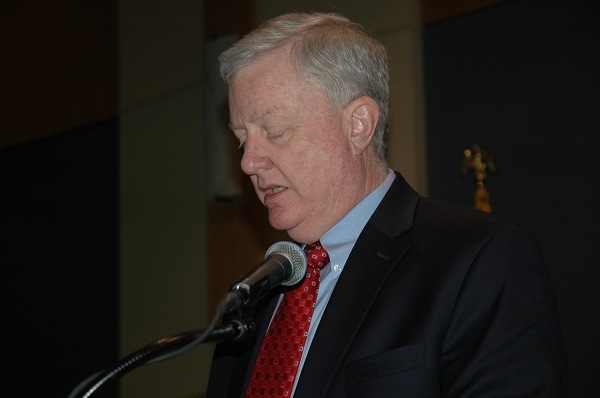
John Maguire, vice president for Washington Operations for the National Cotton Council, told participants in the 57th annual Plains Cotton Growers annual meeting that it is “time to reboot and refocus,” now that a new farm law is in effect.
Important issues remain, Maguire said in what was likely his last presentation to the PCG annual meeting. He will retire this year after 36 years in the cotton industry.
He said the long, drawn out battle to pass a farm bill at times showed some fractures in what is usually a united front of farm organizations. “It’s time we resolve our differences internally,” he said, and face several challenges that will affect all of agriculture. “Agriculture organizations have to reconnect and work together.”
If you are enjoying reading this article, please check out Southwest Farm Press Daily and receive the latest news right to your inbox.
He said completing work on boll weevil and pink bollworm eradication should be a cotton industry priority, especially since the programs have almost succeeded. “We have seen a $1 billion economic and environmental benefit from these programs,” Maguire said.
He expects no significant legislation to pass in 2014 “ahead of mid-term elections. Tax reform may be considered by the next Congress but not this one,” he said. Several tax issues should be addressed, he added, including cash accounting. Bonus appreciation and other tax issues that may be extended could affect agriculture.
Free trade agreements, particularly the Trans Pacific agreement, could have negative effects on cotton. A European trade agreement also will be important.
“Growers have important stakes in these negotiations,” he said.
Maguire said immigration reform is unlikely to go anywhere this year. “We have lost an opportunity.”
WTO, he said, is behind us, but if the Brazil Cotton Case comes up again, “the Council will represent the cotton industry in front of the WTO. The issue may still not be completely resolved, but the farm bill was the first step. We knew the cotton program had to be modified to be in compliance.”
He said regulatory issues will continue to dog agriculture. He cited the recent proposal created to clarify Waters of the U.S. as an issue the Council will follow to determine if those rules “broaden EPA authority.”
Changes in the Farm Worker Protection Standard and the recent listing of the Lesser Prairie Chicken as a threatened species also warrant attention. “We will continue to monitor the Lesser Prairie Chicken issue to assure that regular farming practices are exempt,” he said.
Maguire said changes to the cotton program in the Agriculture Act of 2014 include a heavy reliance on crop insurance for a producer safety net. The STAX program will not be in effect until 2015 but details will be available later this year. Cotton farmers may choose STAX or a Supplemental Coverage Option.
Producers of other crops also have Price Loss Coverage (PLC) and Agriculture Risk Coverage (ARC) options. “These are irrevocable decisions,” Maguire said. “Be patient, however. It takes time to create the rules for the programs.”
Those programs will be available in 2014. Cotton will be under a transition program until STAX is in place, next year for most cotton-producing counties. Maguire encouraged farmers to learn as much as possible about each option and take advantage of learning sessions available through NCC and land grant universities.
He also noted that the crop insurance subsidies included in the new farm program will be a target for legislators looking for ways to slash the agriculture budget. Currently, crop insurance is not part of the sequestration. “But it will be a target. We see challenges ahead.”
Maguire said other issues to be aware of will be the Secretary of Agriculture’s determination of what “actively engaged” will entail.
He also encouraged farmers and industry leaders to be involved in upcoming elections. “Support candidates who support agriculture,” he said.
PCG Executive Vice President Steve Verett praised Maguire for his many years of work and loyalty to the cotton industry. “No one in D.C. has been more respected,” Verett said, as he presented Maguire a plaque recognizing his service. “You will be sorely missed.”
Maguire said the Council has been “successful as a staff because you (cotton growers) have let us be successful. I am optimistic about the future of the industry. Manufacturers (textile) are coming back to the United States.” He cited new plants planned for Georgia and North Carolina. “Natural gas availability helps,” he said, “as does economic assistance provisions.”
Integrity will be crucial for crop insurance says PCG’s Verett
In response to an audience question about the new cotton program, Maguire said cotton farmers will be “ahead of other commodities,” in future farm legislation debates. “This could be the model for the next farm bill. It’s easier to talk to a legislator about insurance than about subsidies. The focus will be on insurance in the next farm bill. And it will be more like the cotton program.”
Also of interest:
Shawn Holladay is PCG president
COTTON SPIN : 2014 cotton crop more export dependent than usual
Farmers have decision aide tool for cotton root rot management
About the Author(s)
You May Also Like






